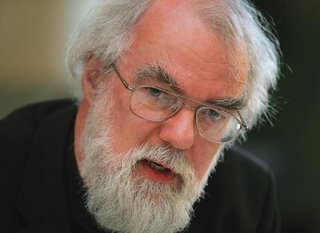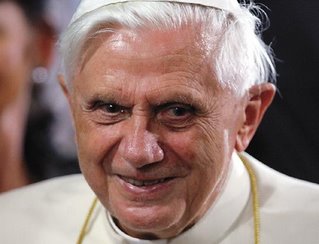 Fascininating interview with the Archbishiop of Canterbury, Rowan Williams, in the Church Times (UK) this morning on his week long visit with Pope Benedict: "Less an Roman holiday, more an Italian job.
Fascininating interview with the Archbishiop of Canterbury, Rowan Williams, in the Church Times (UK) this morning on his week long visit with Pope Benedict: "Less an Roman holiday, more an Italian job.The reporter, Paul Handley, does not flinch from asking Blessed Rowan questions about the ordination of women and LGBT people in the church. And, although I wish he were as clear about the ordination of LGBT people as he is about women, neither does Rowan flinch in his responses.
This may come as a surprise to you, but here are the snippets of quotesI found brought calm to my soul:

That’s why you’re not a Roman Catholic. Why are you an Anglican?
I’m an Anglican because this is — it’s what I learnt in Sunday school, really — this is the Church Catholic in this place, gathered around the word and the sacrament, exercising a canonically continuous, recognisable form of the threefold ministry, structurally slotting in with how Catholic Christianity works.
If you were starting from scratch, do you think the Anglican model works better than the Roman one?
Pwff! — by what imaginable standards would you answer that, I wonder? I don’t know, but the argument I’d give, I think, is not unrelated to what Vincent Donovan says in his book Christianity Rediscovered, responding to mission in East Africa, where he says, in a sense, you’ve got to let Churches grow out of their local setting, discover the need for recognisability, and build outwards from that. He describes the process by which some of his converts in East Africa almost invented the idea of Catholic ministry for themselves, the idea that if this is the kind of community that we are, if this is what the eucharist means, then we need that to be recognisable, and we need to know that, when we travel, it’s the same Church that we belong to, gradually accumulating like that. I think that’s a bit more Anglican than someone saying, “We’ll decide from the centre what the shape will be.”
It’s just that one of the criticisms at the moment is that Anglicanism seems to be heading more towards a centrist approach, through the Windsor-report process. Is that fair?
No, I don’t think it’s fair at all, actually. The problem is the opposite, if anything [Laughs]: that cultural differences, theological differences, are so much wider than even 30 years ago, that how Anglicans in different parts of the world are recognisable to each other is a much tougher question. You can’t just answer it now in terms of the Prayer Book, or a faint aroma of wax polish on the pews, a sort of diffused Englishness. You’ve got the linguistic variety: you’ve got the fast-growing French-speaking, Portuguese-speaking, Spanish-speaking elements of the Anglican Church. So there’s got to be a more serious way of answering the question: “What makes us recognisable to each other?”
But that is a different question from — back to the gatekeeper — “Do we need a supreme curia?” I hope we don’t, and I don’t want to see centralising. I do want to see a degree of convergence, and how to achieve that without centralising, without again loading something on to a set of central institutions that’s very unclear. But it seems to me, that’s one of the big bits of the agenda for the next few years for the Communion.
The other approach is to have a credal focus.
— which of course we have. As we’re often reminded, we do say the same creeds. But it seems, with the widening gaps about culture and theological understanding, we need something a bit more intentional than that, a bit more expressive of responsibility to and for one another. So that’s why I don’t think a credal focus alone will do it.
Whew! A response to the 'Nervous Nellies' who want 'Daddy' to settle every little (or big) dispute: No foreign ("supreme") curia.
Whew! A response to the 'Simple Simons' who want us all to sign onto a Confession of Faith and be done with it: Not just a credal focus alone.
Now, the stuff about the 'Two Teir Membership' is problematic - or, as I call it "The Upstairs, Downstairs Membership - but if we take the approach of the good Archbishop of Cape Town (see article below), I think even that can be worked out.
It's a good morning in the Anglican Communion this morning - at least on this side of the pond. I finding myself more hopeful than I probably have a right to.
Then again, I have always been a 'prisoner of hope.'
I have come to know it as the earthly state of the faithful follower of Christ.
Read the whole article for yourself. If the link above is not "hot" try typing this into your browser: www.churchtimes.co.uk/content.asp?id=28990
1 comment:
Finally, Elizabeth, I can comment here. I had to create a non-existant blog to do it.
I'm happy that you found the positive in AB Williams' interview.
As for his answer as to why he is Anglican, that's pretty lame too, I think. Sometime after Sunday school, he must have made a choice. I was a Roman Catholic for 60 years of my life, and then chose to make a change to the Episcopal Church. Obviously, I had reasons for my choice.
I did not find the interview very satisfactory. He still sounds wishy-washy. Maybe he means well and, in the end, will do the right thing but has a tin ear for how he comes across.
Of course, the interviewer was lame too. Oooh, he's going with Jane to see the Pope, obviously a major obstacle to any sort of meaningful discussions, as she will be such a distraction to the men.
Post a Comment